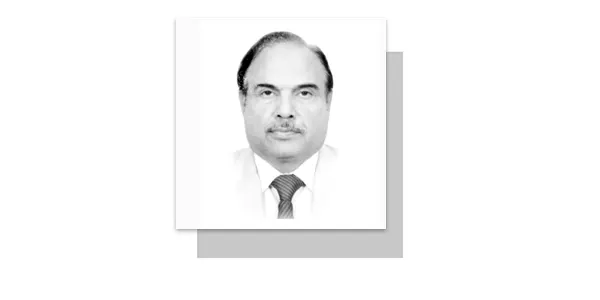THE pressing question that occupies many minds is: What should be done about Imran Khan? His supporters envision him as a ‘knight in shining armour,’ ready to seize power the moment he leaves prison. In stark contrast, his detractors long for his permanent disappearance from the political landscape.
The real quandary, however, lies with the current establishment, whose predecessors both elevated and ousted Imran Khan from power—decisions that came at significant national cost. Finding a way to resolve the ongoing political crisis while averting an impending tragedy remains a formidable challenge for those in charge. No country can sustain the kind of relentless civil strife that Imran Khan’s brand of politics incites, especially when it serves only to protect his interests or facilitate his return to power by any means necessary. His reckless approach is a clear and present danger to any nation, let alone one with fragile democratic institutions like Pakistan.
Ironically, a leader’s popularity can often become his greatest liability. An unpopular leader might be left to languish in obscurity, but a figure capable of mobilizing mobs to wreak havoc poses a unique threat to an already fractured and vulnerable society. The responsibility to counteract Imran Khan’s disruptive politics initially fell on his opponents, particularly those currently in power. However, the PPP and PML-N opted to bask in the perks of governance while shirking the political accountability that power demands. They mistakenly assumed their benefactors had no choice but to keep them in office. Their strategy—leaving it to ‘others’ to handle Imran Khan, treating him as someone else’s ‘illegitimate problem’—is likely to backfire in the long run, with consequences they may not fully grasp yet. This, in essence, encapsulates the political gridlock gripping the nation today. Like all such impasses, it is bound to break eventually, as the force of history is inexorable and unstoppable.
As long as Imran Khan remains in jail, his political relevance endures—though it gradually diminishes with each passing day, eroded by his own destructive politics and the opportunistic cronies and political scavengers maintaining his faction. If and when he is released, however, he poses a significant national security threat, steadfastly adhering to his uncompromising doctrine of “my way or the highway.” All fascists share a similar mindset: “It is either me or nothing.” What sets Imran Khan apart from historical figures like Hitler or Stalin is not the dangerous cult of personality he has cultivated, but absence of substantive achievements to underpin it.
Hitler, for all his atrocities, lifted Germany out of the economic despair of the First World War, transforming it into a formidable industrial power before unleashing catastrophic wars and genocides. Stalin, despite his tyranny and the millions who perished in the Gulags, industrialized the Soviet Union and played a pivotal role in defeating Nazi Germany. The propaganda surrounding such figures was so potent that even their victims mourned their deaths—Stalin’s in 1953 being a prime example. The destructive power of indoctrination, rooted in propaganda, is a sobering reminder of the dangers posed by unchecked populism and authoritarian ambitions.
Imran Khan, by contrast, built his “cult following” almost entirely on propaganda, bolstered by his handlers both at home and abroad. Unlike historical leaders who combined charisma with tangible achievements, Khan’s record offers little to substantiate his claims, making him less formidable and more susceptible to being politically neutralized. His domestic handlers manipulated media narratives to serve their own power-driven agendas, while international actors supported him for more insidious purposes—seemingly aiming to push Pakistan toward the chaos of an “Arab Spring”-style implosion. For now, Imran Khan is physically secure in jail, but if released, he becomes an easy target for forces intent on plunging Pakistan into deeper turmoil. History shows that when politicians begin to see themselves as indispensable due to their popularity, they paradoxically render themselves both unaffordable and expendable. Khan is no exception. He was given a historic opportunity to foster real change in a society desperate for it. Instead, he discarded those genuinely committed to reform and chose a path of self-destruction—one that has not only harmed his own political standing but also jeopardized the party he spent over a decade building.
If one were to identify the single greatest obstacle to Imran Khan’s return to power, it would be his loss of trust. Trust, like glass, is fragile; once shattered, it cannot be restored to its original state. Let there be no illusions: both Pakistan Tehreek-e-Insaf (PTI) and its founding chairman, Imran Khan, are facing a critical existential crisis. Those who believe otherwise are either blind cult followers, naive idealists, or, worse, enemies disguised as allies.
The only viable lifeline for PTI and its founding chairman is to rebrand the party through measured and pragmatic politics—a process that could take several years. The first step in this direction would be to hold transparent intra-party elections, empowering party workers to choose their leadership rather than enduring the dominance of cronies and opportunists. Such a move would pause the party’s agitational politics and civil strife, allowing time to reset both its political direction and the nation’s trajectory.
For democracy to take root and flourish, it must deliver tangible results. Now is the moment for political parties to accept the reality that they must practice democracy internally before preaching it externally. The hybrid governance model is nearing the end of its utility, leaving the nation with a clear choice: either embrace democracy in its true form or face another iteration of unchecked authoritarian rule.
—The writer is former Secretary Election Commission of Pakistan and currently Chairman National Democratic Foundation.
(kmdilshad@hotmail.com)









